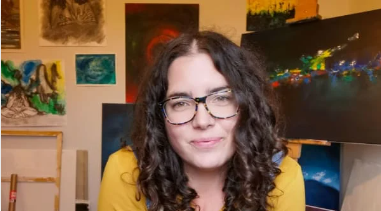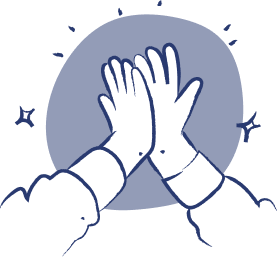“When words fail me, my pencil speaks”
There is something so joyful in finding the light within it when it has been dark for so long. Maybe without encephalitis I wouldn’t have reconnected with art again, and I wouldn’t have had all the opportunities I have had this year (I have been a Sophie Tea Art Nudie, have shown art in galleries and am taking part in Twitter Art Exhibit 2022 in aid of Encephalitis International). I am now an artist, painting and sharing my experience with others.
I hope that my story can give others hope.
In November 2019 I started to feel run down. Initial diagnosis was an ear infection. However, after a week of antibiotics and steroids I wasn’t any better. I was lethargic, sleeping for hours of the day. I began to become unsteady on my feet. The GP added in another antibiotic and some more steroid ear drops. He still felt it was a bad ear infection and advised me to continue.
I began to forget things. I forgot how to put my shoes on, how to get dressed. I got up one morning and showered with my clothes on. I started hallucinating, noises were unbearably loud. Friends and family began to worry. I phoned the GP and updated him with my symptoms; he seemed to think the cocktail of antibiotics and steroids was what was causing the confusion and to persevere. So I did.
Around this time is where I start to lose any recollection of what happened. I only remember my eyelids feeling so incredibly heavy and I sank down into darkness.
On the 6th December, after 3 weeks of gradually declining, I was admitted to A&E. I had a CT scan and was started on intravenous medication. My family and friends were told I was incredibly unwell, they believed it was Encephalitis and that they couldn’t give a prognosis.
The next day I had a lumbar puncture and an MRI. The MRI showed patches of swelling, enough to confirm Encephalitis and with the other results they diagnosed HSV Encephalitis.
I had 3 weeks of treatment, a combination of intravenous in the hospital and then high dose orals to get me home for Christmas.
The hospital part was the easy part for me, although I am sure it was harder for those witnessing it. It was the recovery that really impacted me, physically and mentally. I was advised it could be up to a year before I felt well enough to be doing ‘normal’ things like returning to work. I couldn’t cope with this timeline. I was absolutely determined to be back to work in 6 months, even though at this point I was still sleeping up to 18 hours of the day and could barely walk to the bathroom and back. I truly believed ‘I will be different’.
Artist Brie Purse
The more I ignored my body the more my mental health declined. I became lower in mood, feeling defeated, like I had completely lost myself. I could feel myself spiraling into a darker place. I don’t think until you are in that place you truly understand how it feels. Some days I just didn’t want to exist. So I reached out for help, recognising I needed support and I didn’t want to feel like this. I started therapy in March 2020.
Then the pandemic came. We went into lockdown. All services local to me stopped. My appointments got cancelled or went to telephone contact. Therapy switched to virtual. My support network became small. I went into survival mode. My days were filled with very little joy.
I began to panic about dying all the time. Sometimes it was a low level threat. Other times it felt like a real threat to me, I would have a panic attack and I would quite literally be floored.
I would drift through the day, bouncing from panic attack to panic attack. I knew I needed to find something that would distract me. I had lots of suggestions from friends and professionals -Meditation, mindfulness, reading, music, cooking, walking. I ticked them off one by one. Some helped, some caused more frustrations. It is a difficult balancing act because you have days where you can feel so utterly drained that just moving feels like the task of the day. Planning things was almost impossible.
One afternoon I asked my husband to get my art collection down from the loft. I had studied Art at college and then University so had a collection of odds and ends. I sat and I drew that afternoon and I lost hours, completely absorbed in this magical world. Slowly I began to draw more and more, and then I began to paint. Whilst I was drawing and painting I was tuning into myself. I was expressing how I was feeling through my Art. I was listening to myself, my body, my heart and soul and what it needed to say. At times when I couldn’t verbalise how I was feeling, Art became my voice.
As time went on and I became more confident and comfortable sharing my work I began to post on Instagram. Some of the darkest pieces I paint and share are the ones that have the biggest impact. I think people can relate on so many levels. That loss of identity, abandonment, struggle and the determination to find myself is something that runs throughout a lot of my pieces.
My Art has gone from strength to strength and so have I. I still have my struggles, PTSD being one of the hardest to manage at times. My turning point was finding a form of expressing myself and making sense of what had happened to me. I could have just given up, and there were times when that felt like an option, but I am a stubborn individual and I believed that it had to get better.
For anyone in recovery I would really recommend finding an outlet for expressing yourself. Art is so accessible to all, it doesn’t have to be perfect. There is no right or wrong. It doesn’t even need to be shared with the world. It just needs to be something for you. Pick up a pencil and see what happens.
I accepted that I am always a work in progress and instead of fearing this, I feel the endless possibilities.
Brie
Brie is taking part in the Twitter Art Exhibit for Encephalitis International – Get Involved


